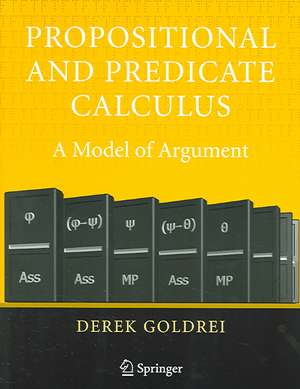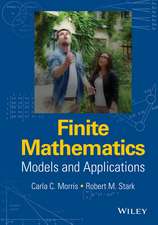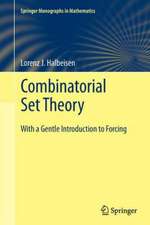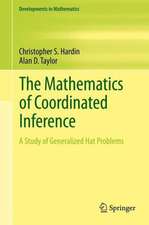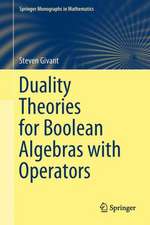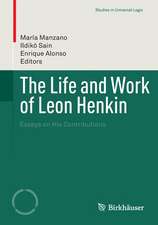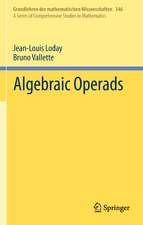Propositional and Predicate Calculus: A Model of Argument
Autor Derek Goldreien Limba Engleză Paperback – 8 sep 2005
- the representation of mathematical statements by formulas in a formal language;
- the interpretation of formulas as true or false in a mathematical structure;
- logical consequence of one formula from others;
- the soundness and completeness theorems connecting logical consequence and formal proof;
- the axiomatization of some mathematical theories using a formal language;
- the compactness theorem and an introduction to model theory.
This book is designed for self-study, as well as for taught courses, using principles successfully developed by the Open University and used across the world. It includes exercises embedded within the text with full solutions to many of these. Some experience of axiom-based mathematics is required but no previous experience of logic.
Preț: 495.09 lei
Nou
Puncte Express: 743
Preț estimativ în valută:
94.74€ • 99.37$ • 78.87£
94.74€ • 99.37$ • 78.87£
Carte tipărită la comandă
Livrare economică 01-15 aprilie
Preluare comenzi: 021 569.72.76
Specificații
ISBN-13: 9781852339210
ISBN-10: 1852339217
Pagini: 324
Ilustrații: VIII, 315 p.
Dimensiuni: 189 x 246 x 17 mm
Greutate: 0.59 kg
Ediția:2005
Editura: SPRINGER LONDON
Colecția Springer
Locul publicării:London, United Kingdom
ISBN-10: 1852339217
Pagini: 324
Ilustrații: VIII, 315 p.
Dimensiuni: 189 x 246 x 17 mm
Greutate: 0.59 kg
Ediția:2005
Editura: SPRINGER LONDON
Colecția Springer
Locul publicării:London, United Kingdom
Public țintă
Lower undergraduateCuprins
Propositions and Truth Assignments.- Formal Propositional Calculus.- Predicates and Models.- Formal Predicate Calculus.- Some Uses of Compactness.
Recenzii
From the reviews of the first edition:
"The aim of the present book is to give an introduction to propositional and predicate calculus which can be very useful when studying mathematical logic and many other mathematical subjects. … The book is mainly conceived for the independent study of the students … but it can also be used for taught courses. It is to be mentioned that the book includes very interesting exercises, many of them possessing full solutions." (Marius Tarnauceanu, Zentralblatt MATH, Vol. 1082, 2006)
"The aim of the present book is to give an introduction to propositional and predicate calculus which can be very useful when studying mathematical logic and many other mathematical subjects. … The book is mainly conceived for the independent study of the students … but it can also be used for taught courses. It is to be mentioned that the book includes very interesting exercises, many of them possessing full solutions." (Marius Tarnauceanu, Zentralblatt MATH, Vol. 1082, 2006)
Textul de pe ultima copertă
At the heart of the justification for the reasoning used in modern mathematics lies the completeness theorem for predicate calculus. This unique textbook covers two entirely different ways of looking at such reasoning. Topics include:
- the representation of mathematical statements by formulas in a formal language;
- the interpretation of formulas as true or false in a mathematical structure;
- logical consequence of one formula from others;
- formal proof;
- the soundness and completeness theorems connecting logical consequence and formal proof;
- the axiomatization of some mathematical theories using a formal language;
- the compactness theorem and an introduction to model theory.
This book is designed for self-study by students, as well as for taught courses, using principles successfully developed by the Open University and used across the world. It includes exercises embedded within the text with full solutions to many of these. In addition there are a number of exercises without answers so that students studying under the guidance of a tutor may be assessed on the basis of what has been taught.
Some experience of axiom-based mathematics is required but no previous experience of logic. Propositional and Predicate Calculus gives students the basis for further study of mathematical logic and the use of formal languages in other subjects.
Derek Goldrei is Senior Lecturer and Staff Tutor at the Open University and part-time Lecturer in Mathematics at Mansfield College, Oxford, UK.
- the representation of mathematical statements by formulas in a formal language;
- the interpretation of formulas as true or false in a mathematical structure;
- logical consequence of one formula from others;
- formal proof;
- the soundness and completeness theorems connecting logical consequence and formal proof;
- the axiomatization of some mathematical theories using a formal language;
- the compactness theorem and an introduction to model theory.
This book is designed for self-study by students, as well as for taught courses, using principles successfully developed by the Open University and used across the world. It includes exercises embedded within the text with full solutions to many of these. In addition there are a number of exercises without answers so that students studying under the guidance of a tutor may be assessed on the basis of what has been taught.
Some experience of axiom-based mathematics is required but no previous experience of logic. Propositional and Predicate Calculus gives students the basis for further study of mathematical logic and the use of formal languages in other subjects.
Derek Goldrei is Senior Lecturer and Staff Tutor at the Open University and part-time Lecturer in Mathematics at Mansfield College, Oxford, UK.
Caracteristici
Designed specifically for guided independent study A wealth of worked examples and exercises encourage active participation in the development of the material Focuses on core material that is vital for many directions of further study No prior knowledge of logic is assumed Includes supplementary material: sn.pub/extras
